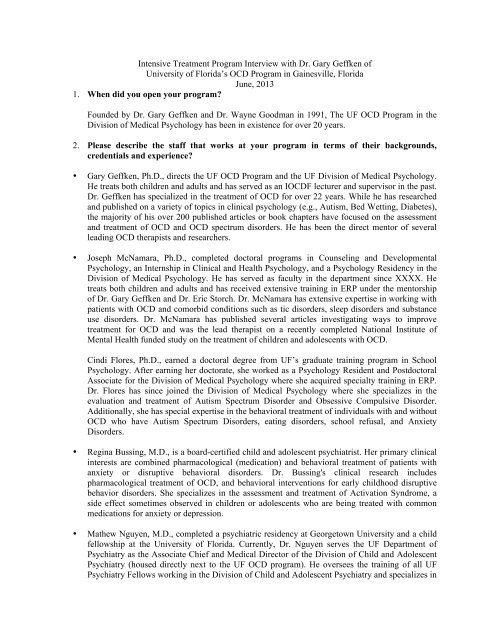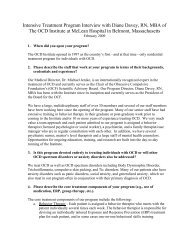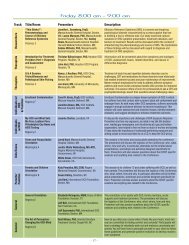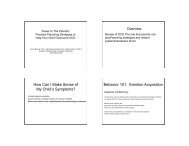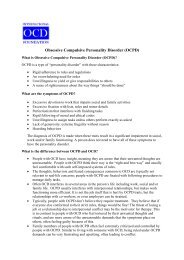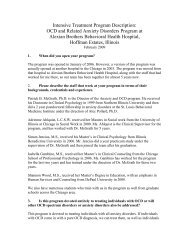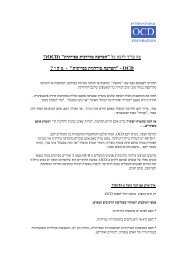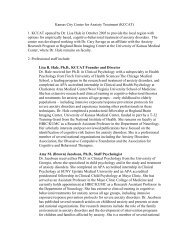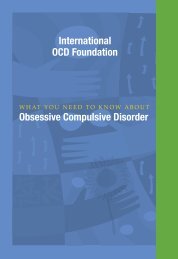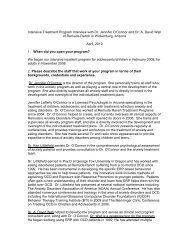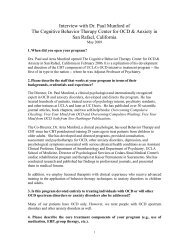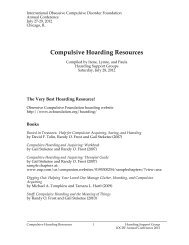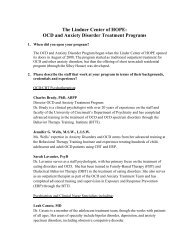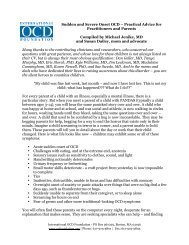Detailed Program Description - Obsessive Compulsive Foundation
Detailed Program Description - Obsessive Compulsive Foundation
Detailed Program Description - Obsessive Compulsive Foundation
Create successful ePaper yourself
Turn your PDF publications into a flip-book with our unique Google optimized e-Paper software.
Intensive Treatment <strong>Program</strong> Interview with Dr. Gary Geffken of<br />
University of Florida’s OCD <strong>Program</strong> in Gainesville, Florida<br />
June, 2013<br />
1. When did you open your program<br />
Founded by Dr. Gary Geffken and Dr. Wayne Goodman in 1991, The UF OCD <strong>Program</strong> in the<br />
Division of Medical Psychology has been in existence for over 20 years.<br />
2. Please describe the staff that works at your program in terms of their backgrounds,<br />
credentials and experience<br />
• Gary Geffken, Ph.D., directs the UF OCD <strong>Program</strong> and the UF Division of Medical Psychology.<br />
He treats both children and adults and has served as an IOCDF lecturer and supervisor in the past.<br />
Dr. Geffken has specialized in the treatment of OCD for over 22 years. While he has researched<br />
and published on a variety of topics in clinical psychology (e.g., Autism, Bed Wetting, Diabetes),<br />
the majority of his over 200 published articles or book chapters have focused on the assessment<br />
and treatment of OCD and OCD spectrum disorders. He has been the direct mentor of several<br />
leading OCD therapists and researchers.<br />
• Joseph McNamara, Ph.D., completed doctoral programs in Counseling and Developmental<br />
Psychology, an Internship in Clinical and Health Psychology, and a Psychology Residency in the<br />
Division of Medical Psychology. He has served as faculty in the department since XXXX. He<br />
treats both children and adults and has received extensive training in ERP under the mentorship<br />
of Dr. Gary Geffken and Dr. Eric Storch. Dr. McNamara has extensive expertise in working with<br />
patients with OCD and comorbid conditions such as tic disorders, sleep disorders and substance<br />
use disorders. Dr. McNamara has published several articles investigating ways to improve<br />
treatment for OCD and was the lead therapist on a recently completed National Institute of<br />
Mental Health funded study on the treatment of children and adolescents with OCD.<br />
Cindi Flores, Ph.D., earned a doctoral degree from UF’s graduate training program in School<br />
Psychology. After earning her doctorate, she worked as a Psychology Resident and Postdoctoral<br />
Associate for the Division of Medical Psychology where she acquired specialty training in ERP.<br />
Dr. Flores has since joined the Division of Medical Psychology where she specializes in the<br />
evaluation and treatment of Autism Spectrum Disorder and <strong>Obsessive</strong> <strong>Compulsive</strong> Disorder.<br />
Additionally, she has special expertise in the behavioral treatment of individuals with and without<br />
OCD who have Autism Spectrum Disorders, eating disorders, school refusal, and Anxiety<br />
Disorders.<br />
• Regina Bussing, M.D., is a board-certified child and adolescent psychiatrist. Her primary clinical<br />
interests are combined pharmacological (medication) and behavioral treatment of patients with<br />
anxiety or disruptive behavioral disorders. Dr. Bussing's clinical research includes<br />
pharmacological treatment of OCD, and behavioral interventions for early childhood disruptive<br />
behavior disorders. She specializes in the assessment and treatment of Activation Syndrome, a<br />
side effect sometimes observed in children or adolescents who are being treated with common<br />
medications for anxiety or depression.<br />
• Mathew Nguyen, M.D., completed a psychiatric residency at Georgetown University and a child<br />
fellowship at the University of Florida. Currently, Dr. Nguyen serves the UF Department of<br />
Psychiatry as the Associate Chief and Medical Director of the Division of Child and Adolescent<br />
Psychiatry (housed directly next to the UF OCD program). He oversees the training of all UF<br />
Psychiatry Fellows working in the Division of Child and Adolescent Psychiatry and specializes in
the psychopharmacological treatment of children and adolescents with anxiety or mood disorders.<br />
In this capacity he supervises the psychopharmacological treatment of pediatric OCD in both<br />
inpatient and outpatient settings, often working in direct collaboration with the UF OCD <strong>Program</strong><br />
when medication is needed in combination with ERP treatment.<br />
• In addition, the Division of Medical Psychology has interns and postdoctoral associates who are<br />
trained in the areas of CBT-ERP and have received specialty training in the treatment of children<br />
or adults with OCD, anxiety disorders, depressive disorders.<br />
3. Is this program devoted entirely to treating individuals with OCD or will other OCD<br />
spectrum disorders or anxiety disorders also be addressed<br />
• The UF OCD <strong>Program</strong> therapists also provide the leading treatments to address OCD spectrum<br />
disorders and other anxiety disorders. In general, CBT-ERP would be used for other anxiety<br />
disorders and Habit Reversal Training would be implemented for OCD spectrum disorders.<br />
Additionally, a wide range of comorbid conditions can be addressed during OCD treatment.<br />
4. Please describe the core treatment components of your program (e.g., use of medication,<br />
ERP, group therapy, etc.).<br />
• During the first appointment, a comprehensive intake is completed. For those with OCD, an<br />
assessment of symptom severity is conducted using the Children’s Yale Brown <strong>Obsessive</strong><br />
<strong>Compulsive</strong> Scale or the Yale Brown <strong>Obsessive</strong> <strong>Compulsive</strong> Scale at intake and various points<br />
throughout treatment so that we can track improvement in various OCD symptom domains. For<br />
those where the use of CBT-ERP is the best line of treatment, pyschoeducation is provided to the<br />
patient about OCD and why CBT-ERP is the most effective method to treat it. A fear hierarchy<br />
will be generated and a discussion will occur about how the patient and the treatment team will<br />
work in a collaborative manner, at the pace of the patient, to do exercises that prove OCD wrong.<br />
CBT-ERP will then occur until symptom severity is reduced, at which point a discussion of<br />
relapse prevention will occur at the end of treatment. We will address other psychological<br />
symptoms that we know interfere with treatment and, in this vein, we are always adjusting CBT-<br />
ERP treatment to incorporate other treatment techniques to improve treatment response (e.g.,<br />
Motivational Interviewing, Acceptance and Commitment Therapy) as needed. Patients may be<br />
referred to receive consultation with our psychiatry team regarding a medication consultation on<br />
an as needed/as requested basis. However this occurs in rare cases as the research from our and<br />
others clinics and our clinical experience support only using medication in combination with<br />
therapy in very specific cases.<br />
5. Please describe the treatment planning process at your program.<br />
• After the intake, all treatment providers will meet with Dr. Geffken or Dr. McNamara to discuss<br />
the case and create the best individualized treatment plan. This is a collaborative process in which<br />
the family’s stated goals at intake are addressed. This plan will be conveyed to the patient and<br />
their caregivers or family members, as it is important for everyone in the home to understand<br />
OCD or OCD related disorders so that appropriate support can be provided and so family<br />
members understand how to not accommodate to the patient’s symptoms.<br />
6. If someone has a co-morbid condition, can he or she participate in your program Will<br />
there be treatment for the co-morbid condition If so, can you give an example
• Those with any co-morbid conditions are eligible to receive treatment. Treatment priority will be<br />
determined based off what the patient ranks as the most distressing symptoms, what conditions<br />
may interfere with the treatment of others, and time available for treatment. This decision is made<br />
after extensive discussion with the patient and their family. In most cases, treatment can<br />
simultaneously target multiple symptoms. Our providers have stated interests in treating<br />
comorbid anxiety disorders, eating disorders, sleep disorders, school refusal, medical regimen<br />
adherence, bed wetting, and Autism Spectrum Disorders.<br />
7. Are parents, family members, friends, teachers, etc. included in the treatment If yes, please<br />
describe how.<br />
• With OCD treatment, as with many mental health conditions, family members can play a seminal<br />
role in shaping and maintaining treatment outcomes. Thus, we offer Family-Based CBT-ERP<br />
when feasible and appropriate which directly includes family members in the treatment of OCD.<br />
Research shows that involving family members increases familial understanding of patient’s<br />
symptoms and teaches them how to balance supporting the patient versus doing behaviors that<br />
actually maintain the patient’s symptoms and increase stress on the family. In short, involving<br />
individuals who interact with the patient frequently outside of the therapy room often improves<br />
treatment effectiveness. However, familial involvement is up to the patient and in some cases is<br />
not appropriate. In addition, key stakeholders such as teachers may be provided with consultation<br />
to help increase sustainability and adherence to the treatment protocol maintenance in a wide<br />
variety of settings.<br />
8. How often do patients in the program meet with staff individually How long are these<br />
individual sessions<br />
• Decisions regarding the frequency of how often patients meet with staff members is determined<br />
following the intake. In general, patients receiving treatment attend sessions lasting<br />
approximately 60 to 90 minutes. Treatment is offered on a monthly, weekly or daily basis.<br />
9. Is there a set time period for a patient’s treatment in the program What is the overall time<br />
commitment to the program (for example, attend daily for three weeks) How much<br />
flexibility is there in extending someone’s stay if needed<br />
• The frequency and intensity of sessions is determined on a case by case basis. Generally, patients<br />
receive treatment on a weekly basis for approximately 15 sessions lasting approximately 60-90<br />
minutes. Those who participate in the intensive treatment program receive treatment on a daily<br />
basis for 15 sessions lasting approximately 60-90 minutes. There is flexibility in booster sessions<br />
after these 15 sessions, but based off research and clinical experience we generally encourage<br />
patients to at least try a period of time away from treatment (e.g., 1-3 months) at this point to<br />
practice treatment skills before returning to address any remaining symptoms.<br />
10. Is there a homework or “self directed” component to the treatment<br />
• Patients are asked to complete daily homework as part of their treatment in order to facilitate the<br />
treatment, provide opportunities to practice strategies that they have learned in treatment outside<br />
of the office, as well as to help extend treatment gains to the natural environment (e.g., school,<br />
home).<br />
11. Please describe the relapse prevention strategies you use in your program.
• As a way to prevent relapse, prior to concluding treatment, patients are provided with information<br />
regarding the signs of relapse and methods to prevent relapse or seek out help should relapse<br />
occur. As mentioned above, for those where it is feasible, we may slowly decrease the frequency<br />
of treatment after the initial 15 sessions in order to practice relapse prevention. For those who<br />
travel to our clinic from other cities, states or countries, we will offer referrals to trusted treatment<br />
centers closer to home for those who may benefit from additional support.<br />
12. What kind of follow-up do you do for those who complete your program Will the members<br />
or your treatment team be in contact with or willing to consult with the individual’s regular<br />
treatment provider(s)<br />
• Therapists are available to provide consultative support following completion of the program.<br />
Treatment maintenance following participation in our program is key to sustain progress;<br />
therefore, it is our pleasure to provide additional services to support patients’ needs.<br />
13. Do you offer a sliding fee scale or scholarships for those who cannot afford your program<br />
Is the discounted lodging at Ronald McDonald House<br />
The capacity to offer discounted treatment is limited by the current economic climate, although<br />
exceptions are occasionally made and we are always flexible in the amount of sessions for each<br />
patient (although 15 is recommended for best outcomes). Lodging at the Ronald McDonald<br />
House is determined on an individual basis.<br />
14. Does your program only work with individuals who are local or are there arrangements for<br />
those who come from farther away (for example, lodging arrangements)<br />
• Treatment services have been provided to individuals across the United States and internationally.<br />
Those who are interested in receiving services are provided with information on lodging in the<br />
area. Many local hotels, motels, and bed and breakfasts offer a “hospital rate” for those seeking<br />
treatment. For those who may not be able to afford lodging, they may apply to stay at the Ronald<br />
McDonald House. Patients are required to provide their own transportation.<br />
15. Please add any information you think would be helpful in describing the unique aspects of<br />
your program if this has not been covered in the questions above.<br />
• In addition to clinical care, our group conducts research with implications for clinical practices.<br />
Based on research evaluating treatment outcomes for those participating in our program, 80-85<br />
percent show at least a 50 percent reduction in their OCD symptomology after 15 sessions.


